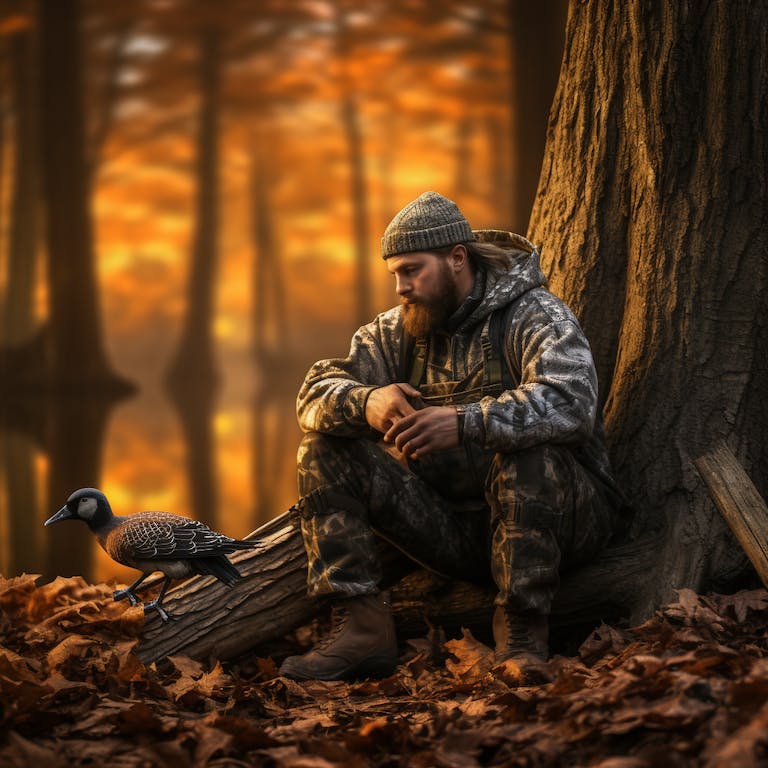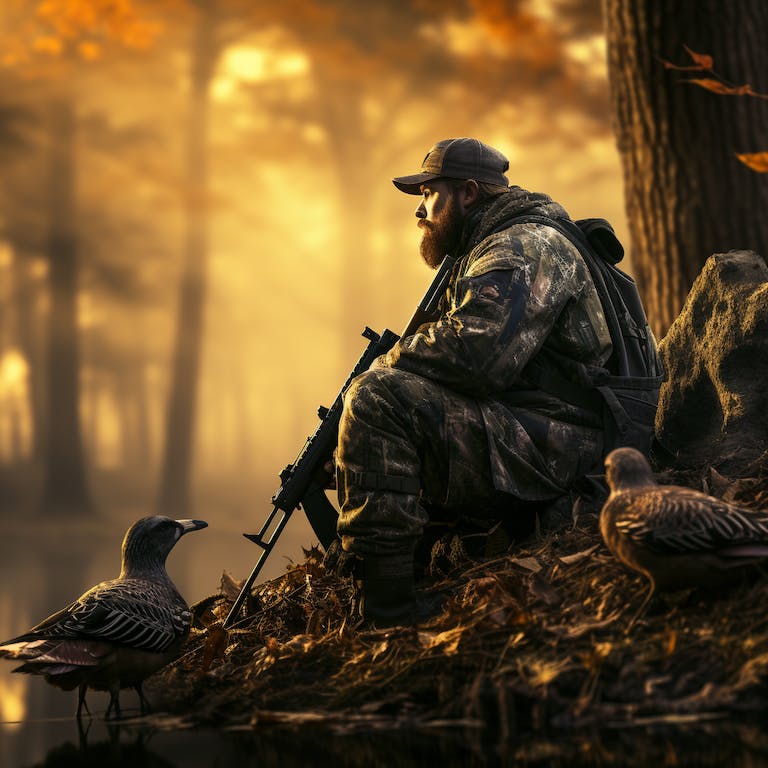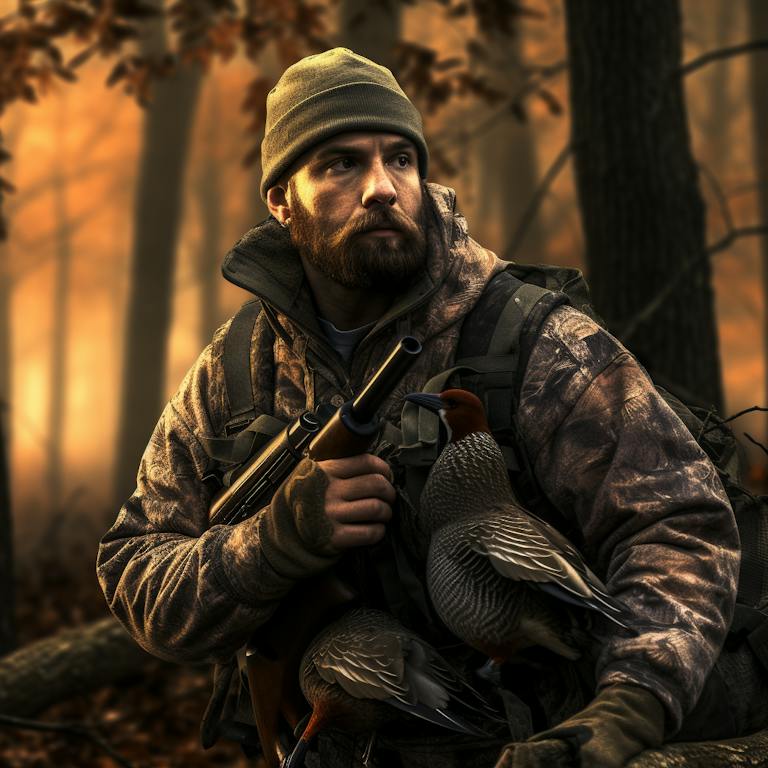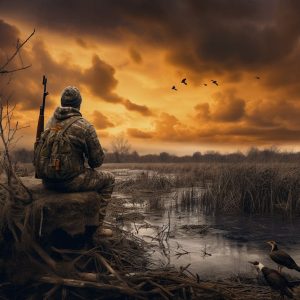If you’ve found yourself eagerly anticipating the thrill of goose hunting in Michigan, you’re in the right place. As the seasons change and the air crisps up, many passionate hunters start wondering, “When is goose hunting season in Michigan?”
Well, fret not – we’ve got you covered with all the essential information you need to plan your next hunting adventure in the Great Lakes State. Whether you’re a seasoned hunter or a newcomer to the sport, understanding the timing of goose hunting season is crucial.
Michigan’s diverse landscapes and abundant waterfowl make it a prime destination for those seeking the rush of the hunt.
So, grab your gear, sharpen your instincts, and let’s dive into the details of when and where you can embark on an exciting goose hunting expedition in Michigan.
Contents
- 1 Season Dates for Michigan Goose Hunting
- 2 Michigan Goose Hunting License Requirements
- 3 When to Hunt Geese in Michigan
- 4 Regulations to be Aware of when Hunting Geese in Michigan
- 5 Conclusion:
- 6 FAQs
- 6.1 When does goose hunting season typically start and end in Michigan?
- 6.2 How many geese can I harvest during the hunting season?
- 6.3 What types of geese are legal to hunt in Michigan?
- 6.4 Do I need a hunting license for goose hunting in Michigan?
- 6.5 Are there any additional regulations or restrictions I should be aware of?
Season Dates for Michigan Goose Hunting
If you love hunting geese, then you probably want to know when goose hunting season in Michigan is. Michigan usually has a few different goose hunting seasons, so it really depends on which type of goose you want to hunt. Here is a breakdown of the different season dates for Michigan goose hunting:
The early season for Michigan goose hunting usually starts around the first week of September and goes until the end of the month.
This is typically when you can hunt for Canada geese. The late season for goose hunting in Michigan usually starts in mid-October and goes until the end of November. This is typically when you can hunt for white-fronted geese, but you can also sometimes hunt for Canada geese during this time as well.
So, if you’re looking to do some goose hunting in Michigan, then you should start planning your trip around one of these season dates. Make sure to get all of your ducks in a row before heading out, so that you can have a successful and enjoyable hunt.

Michigan Goose Hunting License Requirements
If you’re a Michigander looking to do some goose hunting this season, there are a few things you need to know first. For starters, you need to have a valid hunting license. You can obtain a Michigan hunting license by visiting the Michigan Department of Natural Resources website.
In addition to a hunting license, you also need to purchase a Michigan Goose Hunting Permit, which costs $5 for residents and $15 for non-residents. The permit allows you to hunt geese from September 1st through April 30th.
If you’re planning on hunting geese in Michigan, it’s important to be aware of the regulations in place. The Michigan Department of Natural Resources has a list of regulations that you can find on their website. Some of the key regulations to be aware of include:
• You can only hunt geese with shotgun shells that contain steel shot. No lead shot is allowed.
• You can only hunt geese with a shotgun that has a magazine capacity of no more than three shells.
• You can only use decoys that are department approved.
• You can only use nontoxic shot when hunting geese.
Now that you know the Michigan goose hunting license requirements and regulations, you’re ready to start planning your hunt. Remember to check the Michigan Department of Natural Resources website for updates and changes to the requirements and regulations. Happy hunting!

When to Hunt Geese in Michigan
Goose hunting season in Michigan typically runs from 1 September to early February. The exact dates vary slightly from year to year, so it’s important to check the regulations before heading out.
Early season goose hunting can be very productive, as the birds are still in their summer plumage and haven’t been hunted much yet. This is also the time when they are most likely to be found in fields, making them easier to target. However, the early season can also be challenging, as the weather is often hot and the bugs are bad.
Later in the season, the geese have molted into their winter plumage and are more difficult to find. They tend to congregate in areas with open water, such as lakes and rivers.
This can make them tougher to hunt, but many hunters consider it to be the most rewarding time of the season. The cold weather also means that the bugs are gone, making it more pleasant to be outdoors.
If you’re hoping to bag a goose in Michigan, paying attention to the season is key. By knowing when the birds are most active and where to find them, you’ll increase your chances of success.

Regulations to be Aware of when Hunting Geese in Michigan
There are many regulations to be aware of when hunting geese in Michigan. The most important regulation to be aware of is the bag limit. The bag limit is the maximum number of geese that a hunter can shoot in a day. In Michigan, the bag limit is five geese per day.
Another regulation to be aware of is the shooting hours. The shooting hours are the times of day when a hunter can shoot geese. In Michigan, the shooting hours are from one-half hour before sunrise to one-half hour after sunset.
The next regulation to be aware of is the use of bait. Baiting is when a hunter uses food to attract geese to a certain location. In Michigan, baiting is not allowed.
The final regulation to be aware of is the use of decoys. Decoys are fake geese that hunters use to attract real geese. In Michigan, hunters are allowed to use up to 12 decoys.
These are just a few of the regulations that hunters need to be aware of when hunting geese in Michigan. For more information, hunters should contact the Michigan Department of Natural Resources.

Conclusion:
In conclusion, the Michigan goose hunting season dates are September 1 till early February. The best time to hunt is early in the season or later in the season. The reason for this is that the early season provides good weather and the later season provides better chances of finding a migrating flock.
No matter when you go, make sure you bring enough supplies for a comfortable day in the woods. Dress in layers so you can stay warm, even if the weather takes a turn for the worse.
Don’t forget your food and water, and be sure to pack a first-aid kit just in case. With a little planning and preparation, you’re sure to have a great time goose hunting in Michigan.
FAQs
When does goose hunting season typically start and end in Michigan?
In Michigan, goose hunting season dates can vary depending on the specific zone you’re in. Generally, the season begins in early September and runs through late December or early February. It’s crucial to check the exact dates for the zone you plan to hunt in, as they can differ across regions.
How many geese can I harvest during the hunting season?
The bag limits for goose hunting in Michigan are set by the Michigan Department of Natural Resources (DNR) and can vary based on factors such as the hunting zone and specific species of geese. Usually the harvest limit is 5 Goose per person.
What types of geese are legal to hunt in Michigan?
Michigan is home to various species of geese, including Canada geese and white-fronted geese. However, the regulations on which species you can hunt may vary. It’s essential to familiarize yourself with the specific regulations for the zone you’re hunting in to ensure you are targeting legal game.
Do I need a hunting license for goose hunting in Michigan?
Yes, a valid hunting license is required for goose hunting in Michigan. In addition to a general hunting license, waterfowl hunters must also obtain a Federal Duck Stamp and a Michigan Waterfowl Hunting License. These licenses contribute to conservation efforts and help maintain sustainable hunting practices.
Are there any additional regulations or restrictions I should be aware of?
Absolutely. Michigan DNR imposes specific regulations to promote ethical and safe hunting practices. Some of these include the use of non-toxic shot, restrictions on certain hunting methods, and adherence to designated shooting hours.






